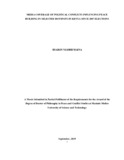| dc.description.abstract | Since the 2007/008 Post-Election Violence (PEV),media coverage on political conflict
has remained a complex yet intriguing issue to unbridle more especially on the Kenyan
peace-building landscape .By and large, it has proved to be an elusive concept, globally,
continentally, regionally, transnationally and locally. Many scholars have written on the
effects media has on conflict situations in Africa particularly on how media fuels conflict.
However, the literature on conflict and peace-building reveals a dismal focus on the role
of the media in peace processes, in fact in fragmentary terms. The greatest problem
surrounding Media Coverage of Political Conflicts and Its Influence on peace building is
that, it has been blamed widely for igniting ethnic hatred and animosity leading to PEV of
2007/2008 in Kenya. There is lack of sufficient literature on Media as a peace building
tool. Yet, the role of the media in the conflict and its ability to mediate peace is not
adequately tackled. This prompted the study. Therefore the study objectively sought to:
examine peace interventions programs employed by Kenyan Media in peace building
since 2007/8 PEV; analyze how Social Media peace messages campaigns can be used for
building peace during and after Kenya 2007/8 PEV and to explore challenges and
opportunities of Kenyan Media in peace building process. The study was guided by three
theories: libertarian, social judgment and social responsibility. The study adopted
descriptive research survey utilizing mainly qualitative techniques of data collection and
analysis which relied mainly on the interviews, questionnaires, FGDs and content
analysis of secondary sources. An interdisciplinary media-political conflict model was
adopted in examining political conflict influence on peace-building. The study area
focused on selected hotspots following the Post-Election Violence in Kenya. These were:
Kibera in Nairobi County, Kibuye in Kisumu County, flower firms in Naivasha, Nakuru
County, Likoni Town in Mombasa County and Kiambaa village in Uasin Gishu County.
The study population included; middle management staff of the media houses in Kenya,
social media users and senior management staff of media houses. The study targeted a
population of 500 from which a sample of 150 was determined scientifically. The study
findings revealed that 30% of news broadcast and 40% of newspaper readers contributed
to media peace intervention programs whereas only 10% of media analysts influenced
publications .The study also found out that 80% of respondents avouched that social
media was effective in peace building and 80% of the respondents agreed that the media
played a huge role in instigating violence. This is a serious challenge. Despite the
phenomenal alchemy that surrounds media coverage and political conflict and consequent
influence on peace building, the study provide a preponderant opportunity to revisit,
make valuable insights and contribute to knowledge in the wider field of peace and
conflict studies. Therefore, the study recommends that, one, media houses should adopt a
common conflict reporting approach key in mitigating discrepancies in coverage. Two,
promotion of continued efforts that scrutinizes social media behavior should be enhanced.
Three, local media reporters and journalists should be engaged in rigorous training on
conflict reporting. | en_US |

